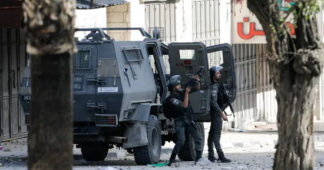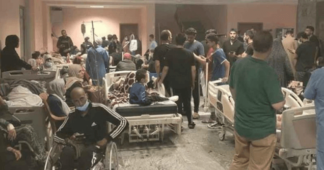This is a difficult, but critical read. The collective hardship experienced by Gaza’s female prisoners in Israel is unprecedented even within the tragic history of Israel’s treatment of Palestinian prisoners. The Palestine Chronicle reports ..
By Fayha Shalash* – Ramallah
Jan 5, 2024
The names of 51 female prisoners, illegally detained by invading Israeli forces during their ground operation in Gaza, have been revealed.
This number was announced by the Palestinian Prisoners’ Affairs Authority in a statement, without confirming whether there are other female prisoners secretly detained in Israel.
Regardless of the exact number, however, the testimonies that were collected from released prisoners reveal shocking abuse, ill-treatment and torture.
The Palestine Chronicle spoke with Lama Khater, from Al-Khalil (Hebron), who was arrested on October 26 and released under the prisoner exchange deal between the Israeli government and the Palestinian Resistance on November 30.
Khater was detained along with ten female prisoners from Gaza and witnessed the abuse they were subjected to.
According to the statement, the list includes elderly women and children, but the total number of female detainees from Gaza is higher.https://t.co/45xriIrq7X pic.twitter.com/dIb8DRiDRK
— The Palestine Chronicle (@PalestineChron) January 5, 2024
Arbitrary Arrest
Khater said the conditions of female prisoners from Gaza were particularly difficult, starting with their kidnapping during their displacement from the northern Gaza Strip.
“They were arrested randomly, mostly from the northern Gaza Strip. Israeli soldiers detained mothers, too, who have been forced to leave their children with passers-by,” she stressed.
Khater recounted that before arriving at Damon Prison, the female detainees were left without covers, subjected to humiliating strip searches and forced to sleep on the bare floor.
When they were brought into the prisons, they were blindfolded, handcuffed, and deprived of their hijab, said Khater.
They were reportedly placed in narrow cells in Damon Prison and not allowed to speak to the rest of the female prisoners from the occupied West Bank and Palestine 48.
“All female prisoners are subjected to great restrictions,” Khater said, “but the prisoners from Gaza were treated even worse.”
“For example, they are only allowed to shower in large groups of at least 50 women, and for not more than 15 minutes a day”.
Khater said that on December 10 and 11, five female prisoners from the Gaza Strip were taken out of Damon prison. Their current location is not yet known.
Among the female Gazan prisoners, some are in a particularly difficult state; an 80-year-old woman who suffers from Alzheimers and a pregnant woman. Both are subjected to medical negligence.
In a recent report, Israeli newspaper Haaretz has stated that an unknown number of Palestinian detainees from #Gaza are being severely abused in a secret military detention camp in the #Negev.#israeliwarcrimes#sahatenglish pic.twitter.com/Ll5bZPxvRy
— Sahat English ?? (@sahatenglish) January 5, 2024
Held in Cages
The Palestine Chronicle also spoke with Palestinian lawyer Hassan al-Abadi, who collected the testimonies of several female prisoners in Damon.
Al-Abadi, who volunteered to visit the female prisoners, submitted his first request to the Israeli Prison Administration on November 30, but was told in response that there were no longer female prisoners in the detention facility.
A few days later, however, media reports revealed that dozens of female prisoners, from Gaza, Jerusalem and Palestine 48, were still held there.
Al-Abadi confirmed to The Palestine Chronicle that there are over 40 female prisoners from Gaza in the facility, but they are prohibited from seeing a lawyer.
“When I would visit any female prisoner from the West Bank or Jerusalem, she would tell me about the harsh conditions of detention of the prisoners from the Gaza Strip,” he said.
Al-Abadi said he was particularly disturbed by the way Israeli forces transported the female detainees from Gaza to the prisons.
According to the lawyer, they were placed in trucks carrying cages similar to those used for animal transport.
“This detail particularly hurt me: these women have been transported in animal trucks. They have been tied, blindfolded and stripped of their head covering, as a way to humiliate them,” al-Abadi said.
Beginning in 1967, Israel's Occupation of Gaza and The West Bank was noted for the systematic use of torture on Palestinian detainees (including the great number of whom were never charged with a crime or offense).
When foreign media reported on the torture chambers of the… pic.twitter.com/fsMDYPNLpK
— History Speaks (@History__Speaks) January 5, 2024
Stained with Blood
The lawyer also said that when the female detainees arrived at the prison, their clothes were stained with blood. Most of them were also bleeding from their hands, as the plastic chains had been tightly tied around their wrists for days.
Upon their arrival, they were distributed into three rooms, each containing six iron beds. Most of them were reportedly forced to sleep on the floor without pillows or mattresses.
“The prisoners told me that the food is also very bad and that the Israeli guards deliberately leave it on their cells’ doors for hours, until it turns cold. The water has a rusty taste as well,” al-Abadi said.
“The female detainees from Gaza are even forbidden from talking to the rest of the prisoners and they have to communicate in secret.”
Al-Abadi shared that one of the women had to leave her four children in Gaza. The eldest was only eight years old, the youngest an infant.
According to the testimony from other prisoners, the woman was walking on Salah Al-Din Street, fleeing from the north of the Gaza Strip, when the Israeli soldiers arrested her.
“When she learned that she would be under arrest, she immediately handed her children to a boy who was walking in the street and told him to take care of them,” al-Abadi said.
“I learned from the other prisoners that she asked about her children every day, crying inconsolably, but nobody was updating her on their fate.”
A few days ago, however, al-Abadi was able to deliver a verbal message to this woman, that her children had eventually reached their father. “This time, she cried out of joy,” he said.
"We stayed blindfolded and cuffed [with zip ties on our hands and feet] for 10 days."
New from HRW — Israel held thousands of workers from Gaza in incommunicado detention for several weeks following the October 7 attacks.https://t.co/adadmVdP0q pic.twitter.com/OuSCP6MXMN
— Human Rights Watch (@hrw) January 4, 2024
Great Concern
According to al-Abadi, these women are not only suffering due to the extremely cruel conditions of their detention but because they are constantly concerned about their families.
They do not know the fate of their children as Israel continues to relentlessly bombard Gaza.
“They are not allowed to hear the news or follow what is happening in any way. They are isolated from the outside world and don’t know anything,” al-Abadi explained.
But there are other forms of violation carried out by Israeli authorities. Al-Abadi told us that the prison administration prevents these women from bringing along sanitary pads
Therefore, during their period, they are forced to wash their clothes daily and wear them when they are still wet, as the prison administration does not provide them with additional clothes. They only have what they were wearing at the time of arrest.
Israel considers men and women detained in the Gaza Strip to be prisoners of war under the so-called “unlawful combatants” law. Therefore, it prevents them from having contact with lawyers and human rights institutions.
* Fayha’ Shalash is a Ramallah-based Palestinian journalist. She graduated from Birzeit University in 2008 and she has been working as a reporter and broadcaster ever since. Her articles appeared in several online publications. She contributed this article to The Palestine Chronicle.
We remind our readers that publication of articles on our site does not mean that we agree with what is written. Our policy is to publish anything which we consider of interest, so as to assist our readers in forming their opinions. Sometimes we even publish articles with which we totally disagree, since we believe it is important for our readers to be informed on as wide a spectrum of views as possible.











